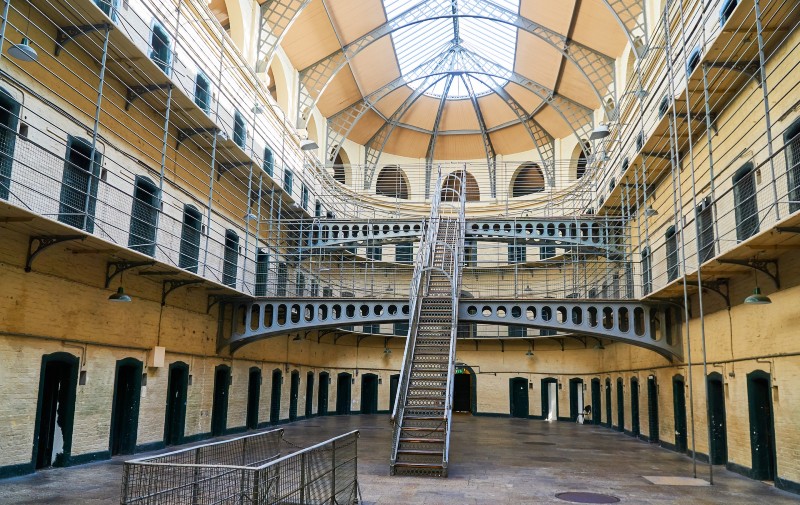The cannabis industry is putting old technology to good use, and in the process giving new life to innovations and security concepts which may have otherwise gone the way of the dinosaur.
In an increasingly cashless world the cannabis industry is still largely cash-based. That causes headaches for cannabis retailers. It also creates opportunities for entrepreneurs.
ATMs, cash counting machines, and armoured transport may not be in high-demand in other industries, however, in the cannabis industry those technologies are vital.
Those are just some of the many examples of how older technology is still thriving in the cannabis industry.
Facility security is extremely important in the cannabis industry, with expensive cannabis crops and products being big targets for would-be thieves.
The facility security needs of the emerging cannabis industry are giving old structures new life around the globe.
Prisons Converted To Cannabis Cultivation Facilities
Cannabis prohibition has existed all over the planet for several decades. Unfortunately, people were sent to prison for simply possessing a plant (cannabis), a plant which researchers have determined to be 114 times safer than alcohol.
The cannabis plant is still prohibited in more places than not, however, an increasing number of jurisdictions around the globe are implementing more sensible cannabis policies.
One of those places is the nation of Zimbabwe.
Zimbabwe legalized hemp production in 2018 for medical and research purposes and legalized hemp production for industrial purposes earlier this year.
The Zimbabwe Industrial Hemp Trust (ZIHT) recently planted six different varieties of hemp, which was the first legally planted hemp crop in Zimbabwe’s history.
Legal hemp being planted in Zimbabwe was historically significant and the location of the planting was significant as well – an old prison facility.
The Harare Central Prison facility was selected as the location for Zimbabwe’s first legal hemp garden because of the security features which were already built into the facility.
Strong walls and watchtowers may not be cutting edge technology, yet they are ideal features for securing a regulated cultivation operation.
The same technology that was designed to keep people in will now be used to keep would-be thieves out.
Zimbabwe is not the first place to convert a former prison facility into a secured cannabis cultivation facility.
Jamaican-born musician and cannabis entrepreneur Damian Marley previously paid millions of dollars to convert a former prison facility into a medical cannabis cultivation facility in California.
As cannabis legalization spreads across the globe more and more former correctional facilities will likely be converted for similar purposes.
Banks Converted To Cannabis Dispensaries
As previously mentioned, the cannabis industry is largely cash-based. Legal cannabis dispensaries conduct literally billions of dollars worth of transactions every year in legal markets.
That enormous amount of cash has to be stored somewhere, and with most banks being unable or unwilling to accept deposits from cannabis retailers, it creates security problems.
An increasing number of cannabis companies are opting for a logical solution – purchase their own bank location. Cannabis dispensaries are buying former bank locations at a growing rate, which makes perfect sense.
Virtually all vacant bank locations have a built-in safe which is perfect for storing a cannabis dispensary’s cash and valuable inventory.
Former bank locations have many built-in security features that are standard in the banking industry and are very useful for cannabis dispensaries.
What used to be teller stations with locking cash drawers and glass barriers now serve as stations for budtenders to perform secure transactions.
Surveillance and alarm systems are required for legal cannabis outlets and fortunately they are already installed at former bank locations.
For many cannabis companies and entrepreneurs, converting a former bank location is more fiscally advantageous than building a cannabis retail facility from scratch.
Car Wash Facilities Converted To Drive-Thru Cannabis Dispensaries
Brick and mortar cannabis dispensaries have existed legally and illegally in various markets for quite awhile.
Much like people can walk into a liquor store or corner market and purchase food and beverages, so too can patients and cannabis consumers walk into a dispensary and purchase cannabis in legal markets.
A new cannabis consumer purchasing experience is popping up in legal markets which will likely become a trend in future – drive-thru cannabis purchases.
A number of products can be purchased via a drive-thru window, including fast food and prescription drugs, so it makes sense for consumers to want to be able to do the same with cannabis.
For some patients, remaining in their vehicle while making a medical cannabis purchase is necessary due to mobility issues. For consumers, it’s a convenient way to obtain cannabis.
From a regulation standpoint, drive-thru cannabis retail is tough because cannabis cannot be purchased in public view. An old building concept is being harnessed by the cannabis industry in a creative way which helps overcome the regulatory hurdle.
Former car wash facilities are ideal locations for cannabis drive-thru retail establishments.
Rather than a car driving through a car wash to be scrubbed and sprayed with hot wax, the car can instead drive through a modified car wash location to make a purchase out of public view.
Cannabis retailers don’t need to replace the car wash facility equipment, but rather remove it, making facility conversions straight-forward and cost effective.
Cars simply drive into the facility on one side of the building, occupants make their purchase, and the car exits out of the other side of the facility. The transaction is secure and out of public view.
This particular business model is very interesting in that car wash facilities were not designed with security technology as a primary focus, however, they are proving to be ideal for providing compliant security for drive-thru cannabis retail transactions.
Expect this to be a popular model going forward as the cannabis industry continues to expand around the world.






